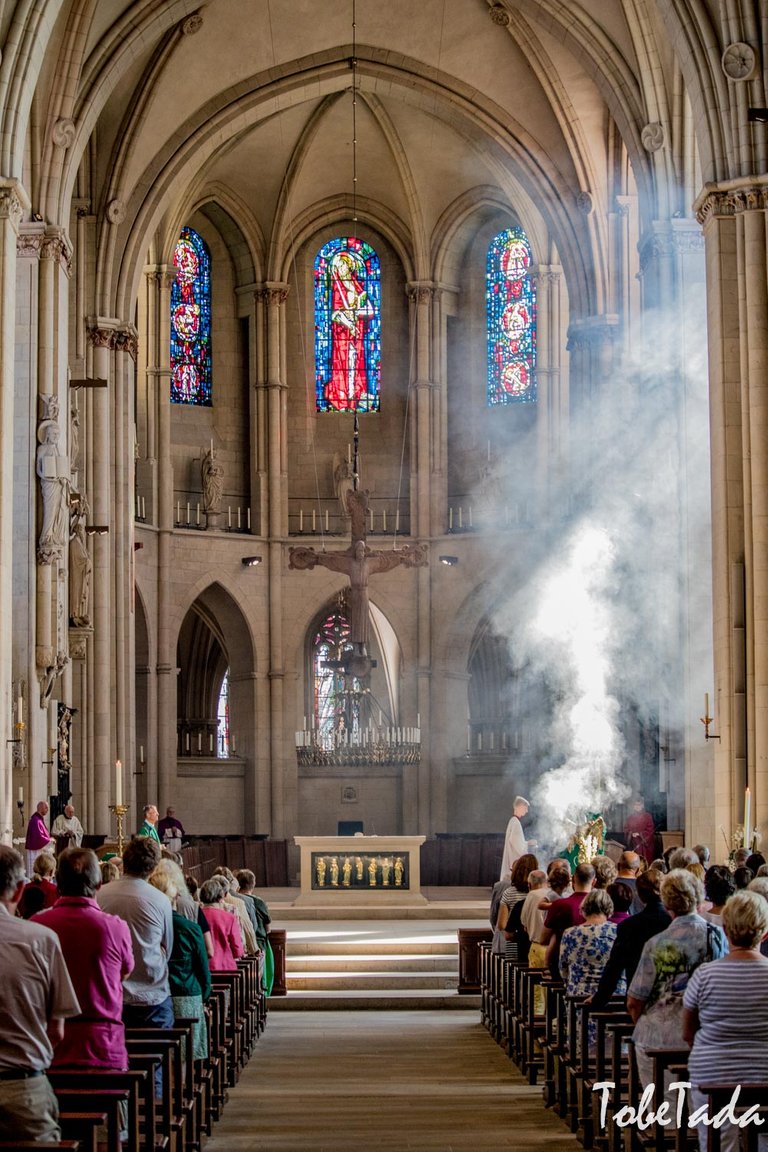For this social lens series we are looking at religious sites and how people relate to these places.
A central ritual within churches are the Sunday Masses which generally occur in the morning. There is a strict procedure in which certain actions have to take place: there is the organ and the group singing which is occasionally accompanied by a choir, the prayers, the reading of passages from the bible and so on. Most people seem to know what to do and how to respond to these situations. However, it would be not too difficult to copy certain behaviors from the people there, thereby acting in union to the group as this seems to be an important part of attending the mass.
The people attending the mass are facing the altar and either sit, kneel or stand, depending on the situation. Only at the end of the ceremony are people invited to walk up to the preacher and participate in what is referred to as communion. More on this in a future post.
The altar constitutes the center of attention and as is common for churches a large cross with Jesus dwells here as well. It is probably the most significant symbol within churches. The cross and the savior Jesus seem to hover here above the ground; almost magically they seem to be suspended in air creating a somewhat dramatic effect.

All of the symbols, the delicate ornaments, the beautiful colored glass windows, the swathes of burning incense and the large spaces surrounding the people amplify the experience here. They effect people's consciousness by making the ceremony much more vivid and real. The rituals and words become much more significant and important, which most likely contributes and enhances people's faith.
It is a ceremony very much for the senses, which might be somewhat strange as one might think that Christianity advocates a life dedicated to asceticism. A conundrum which is perhaps worth exploring further...
flagged for bid bot abuse, @steemflagrewards
Everyone is responsible for purifying the community of steem
净化社区,人人有责
my 2% downvote just is a summons without punish.
我2%的downvote,只是传票,不是惩罚.
The summons is just a reminder that you need to be clear about what you are doing and be prepared for the consequences of your actions.
传票只是提醒您:您要清楚自己在做什么,并且要为自己行为的后果,做好心理准备.
“Smells and bells”
Posted using Partiko iOS
@life.syndication resteem
Posted using Partiko iOS
@contrabourdon Resteemed 👌
Powered by witness untersatz!
You got a 76.78% upvote from @minnowvotes courtesy of @tobetada!
I know that .... You have been in my home town of Münster, and the Cathedral of Münster ( St.-Paulus-Dom )can be recognized immediately.
very nice posts ... thanks :-)
thanks for your reply :)
Extremely well noted: a ceremony for the senses! This goes for Catholicism for sure, the followers of which are seldom remotel ascetic! (They have Confession and Absolution so they can feast a bit.) The Protestants, however, who advocate sobriety have very little for the senses to enjoy in their plain churches and severe preaching (depends on the type of protest invoked, but still).
Your musings (also on Monet) are charming.
thank you so much for commenting! Indeed, maybe I will have a look at the Protestant's churches as well :)